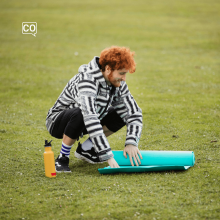Empezar (to start) - Subjuntivo pretérito perfecto, subjuntivo (Subjunctive past perfect, subjunctive) - Spanish

Empezar - Conjugation of to start in Spanish: Conjugation table, examples and exercises in the subjunctive past perfect, subjunctive tense (Subjuntivo pretérito perfecto, subjuntivo).
Subjuntivo pretérito perfecto, subjuntivo (Subjunctive past perfect, subjunctive)
All conjugations and tenses: Empezar (to start) - conjugation and tenses - (Spanish)
Syllabus: Spanish lesson - Fechas del calendario y días festivos. (Calendar dates and holidays)
Conjugation of to start in Subjuntivo pretérito perfecto
- yo haya empezado I have started
- tú hayas empezado You have started
- él/ella haya empezado he has started
- nosotros/nosotras hayamos empezado we have started
- vosotros/vosotras hayáis empezado you have started
- ellos/ellas hayan empezado they have started
Example phrases
- Es increíble que haya empezado tan temprano. It's incredible that it has started so early.
- Me sorprende que hayas empezado la tarea. I'm surprised that you have started the task.
- Es genial que haya empezado a estudiar. It's great that he/she/you (formal) has/have started to study.
- Me alegra que hayamos empezado juntos. I'm glad that we started together.
- Espero que hayáis empezado antes de la lluvia. I hope you have started before the rain.
- Dudo que hayan empezado la prueba a tiempo. I doubt that they have started the test on time.
Exercise: Conjugate the verbs - empezar (to start)
Instruction: Choose the correct word, read the sentence out loud and translate.
Show answers Show translationEmpezar (Subjuntivo pretérito perfecto, subjuntivo)
1. Me sorprende que ... la tarea.
2. Me alegra que ... juntos.
3. Dudo que ... la prueba a tiempo.
4. Es genial que ... a estudiar.
5. Es increíble que ... tan temprano.
6. Espero que ... antes de la lluvia.